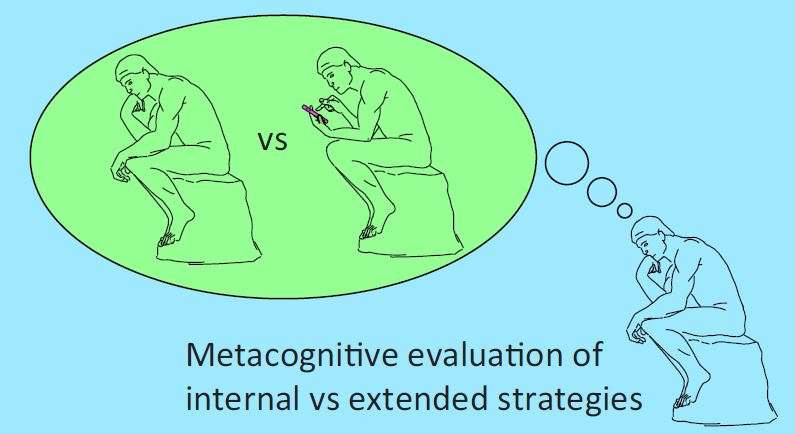Using the outside world to save on brainpower

Every day, we rely on our physical surroundings—friends, gadgets, and even hand gestures—to manage incoming information and retain it. In a Review published August 16 in Trends in Cognitive Sciences, two researchers explain the myriad ways in which forms of assistance from gestures to GPS affect both what we know and what we think we know.
Evan F. Risko, a Canada Research chair in Cognitive Psychology at the University of Waterloo, and co-author Sam Gilbert, a Royal Society research fellow at University College London, call these behaviors "cognitive offloading"—physical actions that reduce the mental effort needed to perform a task. When required to remember an appointment, for example, people are faced with the choice of internally remembering it or "offloading" it, by writing it down in a calendar or setting a reminder with a smartphone. Similarly, your accountant may choose to use a calculator when going over your finances rather than mentally perform all of the necessary computations.
What's happening here, say the authors, is the use of a physical action (writing, using a calculator) to eliminate the need for that internal effort—the cognitive burden. One of the key messages of Risko and Gilbert's Review is that people will engage in such offloading behavior when they believe it is more efficient than their internal abilities. However, these beliefs do not always match reality.
"The growing interaction between people and technology has really brought interest in the subject to the forefront. People want to understand how technology affects the way we think," says Risko. Gilbert adds, "Cognitive offloading undoubtedly brings huge benefits, but also potential costs. We are just beginning to understand these effects. For example, how can technology allow us to remain independent as we grow older, and what might the downsides be to relying on external devices?"
Though some people may think of offloading as harmful to one's ability to remember, the truth is that these strategies are needed for everyday thinking and planning. People will usually turn toward these offloading strategies because we are "capacity limited" in our cognitive abilities. We may be able to remember a list of five, six, or seven numbers, but it's unlikely that we could remember 47 of them. Offloading gives us the ability to "subvert our cognitive limits," say the researchers, who point out that "devices such as smartphones allow us to be more confident and able to do things that we've not been able to do before."
However, offloading can also have negative consequences. "If you're allowed to store some to-be-remembered information on a computer, chances are you won't devote cognitive real estate to remembering it," says Risko. "As a result, your ability to remember that information without the computer will likely be reduced. There's little doubt that these new technologies are affecting what we remember."
Recent research has demonstrated some of the consequences of offloading, particularly when offloading onto electronic devices, such as personal computers or digital cameras. In one study (DOI: 10.1177/0956797613504438), researchers gave museumgoers digital cameras and found that taking photographs degraded subjects' ability to remember the objects they viewed, and specific details about those objects, when compared to their ability to remember objects not photographed. Another study, by Gilbert (DOI: 10.1016/j.neuroimage.2014.10.021), showed that using reminders changed the physical activity inside volunteers' brains when they remembered plans and intentions.
Moving forward, Risko and Gilbert want to focus on the way offloading changes the way we think, as well as what's happening in the brain as a result of different offloading strategies. They are also interested in the long-term consequences of living in a modern, high-tech environment that allows us to constantly offload our cognition.
Risko stressed that these are all questions that can only be answered with time. "There's a lot of conversation about whether devices like smartphones ar¬e ruining us cognitively or not," says Risko. "There isn't a lot of research available yet that addresses the long-term cognitive consequences of offloading. What our Review has shown is that similar scientific principles apply to our use of a wide variety of devices, such as pen and paper, GPS trackers, and smartphones. This should make it easier for researchers to fully understand these devices' consequences in the future."
More information: Trends in Cognitive Sciences, Risko and Gilbert: "Cognitive Offloading" www.cell.com/trends/cognitive- … 1364-6613(16)30098-5 , DOI: 10.1016/j.tics.2016.07.002
L. A. Henkel. Point-and-Shoot Memories: The Influence of Taking Photos on Memory for a Museum Tour, Psychological Science (2013). DOI: 10.1177/0956797613504438
Julia Landsiedel et al, Creating external reminders for delayed intentions: Dissociable influence on "task-positive" and "task-negative" brain networks, NeuroImage (2015). DOI: 10.1016/j.neuroimage.2014.10.021




















